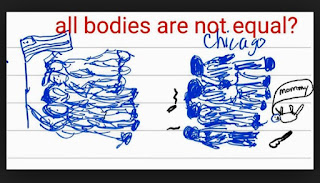Teaching International Journalism, part 8 -- Perceptions
This might sound like an odd choice for a chapter but perceptions are central to your work as a foreign reporter. Perceptions of you by others, perceptions you have of what you are reporting about, and so on, will shape everything about your experience and reporting. This example is not of international reporting per se, but it shows photographers taking a different angle based on who they think a person is.
Compiling reports is more often than not about documenting the distance between yourself and your subjects, however that distance may change over time. We all have our unique set of cultural DNA, deeply rooted in our childhood, and morphing itself as we deepen our life experiences. Editors you will work with will have different distances than you to the topic you are covering, sometimes closer, sometimes further, sometimes with different reference points, which could create tensions, good or bad.
Tasting Your Own Medicine
Think of Sacha Baron Cohen and how he has made most of his career on these perceptions and the humor and truth which can lay inside of them. In Borat (trailer above), the British actor is playing a fake Kazakh journalist visiting the United States, duping Americans along the way, and pointing at their absurdities while acting as absurd as he can himself.
In Brüno, another mockumentary, he's a fake Austrian fashion journalist. While Borat is said to be generally hated in Kazakhstan, Bruno seems to be appreciated by most in Austria, maybe a measure of the distance Cohen himself has from the two. In the U.S., Borat seems to have been liked much more, while Bruno seems to have gone too far, or been too tasteless and demeaning to some, again perhaps a sense of perception and distance from viewers to the Cohen characters.
Here's an article on how some foreign media are viewing the political candidacy of Donald Trump. Here was a multimedia project by Amar Bakshi on how the people he interviewed viewed America in 2008. Slate has a really good series on how U.S. news would be probably be written if done so in the cliche style of American foreign reporters. A recent one was about the Bundy action in Oregon. The series is called "If It Happened There."
Out of Africa
On the how not to cover Africa beat, no one says it better than Binyavanga Wainaina. This article by the same author is called "How To Write About Africa". Here is a video treatment of the same theme. Here's a complaint letter by Western journalists on how Africa is portrayed on the CBS news show 60 Minutes.
Did you know most world maps you see make Africa and also India much smaller than they actually are?
A Passage to India
Articles abound about perceived misconceptions of India seen through foreign eyes. Here's one, and here's another .
Here's a very interesting Frenchman's take on how most foreign correspondents really fumble when writing about India.
And then, there's the whole comparative cottage industry of you show this, well we will show you this instead, such as this photo essay on the sometimes ignored better sides (at least from this author's perspective) of India. Again, no one has exclusivity on this perception "deficit", as you hear much more about the KKK outside the United States than inside for example, and that includes India.
Inequality in Death
There is also the whole issue of whether one death is worth more than another in the media. That discussion alone could fill pages and pages and more pages. Here's an article from 2009 on one journalist's perspective on why all deaths aren't equal in terms of intensity of coverage, based on different plane crashes. Again a question of perceptions, and there is validity to many arguments on all sides of this heated debate. Is the reason economic? Cultural? Geographic?
I once got angry at an editor who refused to let me cover a story in which more than 50 people had died in a ferry accident in the Congo. Doesn't that always happen, she asked? I was furious. I've written about episodes with editors here.
Perceptions of Death
After the Paris terrorist attack of 2015, where was the Lebanese flag on my feed, people wondered? What about my sadness concerning the attack in Kenya, which had happened many, many months before, some wondered? Here's an article comparing coverage following attacks in Beirut the previous day to the ones in Paris.
As the photo above reflects, from this article, it's also much more difficult than people think to confirm the dead in foreign reporting. Police and government reports, or those sent in by militaries or rebels, are not to be trusted. That's why despite all the doom and gloom, it's interesting now with social media to see so many opinions and diverse reports flourish. Maybe more information will equal progress, but sometimes this overflow does seem to fan the flames of mistrust and anger.
If you enjoyed this lesson plan, here are all the chapters in My Guide to Teaching International Freelance Journalism.
Part 1, Geographies
http://thirdratetropics.blogspot.com/2015/12/teaching-international-freelance.html
Part 2, A Brief History Until Today
http://thirdratetropics.blogspot.com/2015/12/teaching-international-freelance_24.html
Part 3, Before You Go
http://thirdratetropics.blogspot.com/2015/12/teaching-international-journalism-part.html
Part 4, Potential Clients
http://thirdratetropics.blogspot.com/2015/12/teaching-international-journalism-part_28.html
Part 5, When You First Arrive
http://thirdratetropics.blogspot.com/2015/12/teaching-international-journalism-part_27.html
Part 6, Surviving the Game
http://thirdratetropics.blogspot.com/2015/12/teaching-international-journalism-part_29.html
Part 7, Books and Films To Educate and Inspire
http://thirdratetropics.blogspot.com/2015/12/teaching-international-journalism-part_30.html
Part 8, Perceptions
http://thirdratetropics.blogspot.com/2015/12/teaching-international-journalism-part_0.html
Part 9, Ethical Considerations
ttp://thirdratetropics.blogspot.com/2015/12/teaching-international-journalism-part_31.html
Part 10, Migrations and the Other
http://thirdratetropics.blogspot.com/2016/01/teaching-international-journalism-part.html
Part 11, Going Glocal
http://thirdratetropics.blogspot.com/2016/01/teaching-international-journalism-part_1.html
Part 12, Musings, Behind the Scenes and Critiques
http://thirdratetropics.blogspot.com/2016/01/teaching-international-journalism-part_4.html




Comments
Post a Comment